SUEANN AMBRON
Scholar in Residence, J.P. Morgan Center for Commodities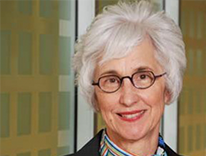
As dean of the University of Colorado Denver Business School from 2000-2015, Sueann Ambron led the school through an era of unprecedented growth in size, stature and program breadth. The Business School's achievements and vision have been enhanced by Dr. Ambron's experience as an educator, executive, entrepreneur, technological innovator and community connector.
Under Dr. Ambron's leadership, the Business School worked with industry leaders to develop and enhance programs in fields including global energy management, commodities, risk management and health administration. By sparking increased executive engagement, Dr. Ambron helped embed the school within the fabric of the Rocky Mountain West business community-enabling Business School students to better gain industry experience before they graduate, and jobs in future-focused fields after graduation. Dr. Ambron's decade-long effort to secure state-of-the-art space for the Business School culminated with the 2012 opening of a six-story building in Downtown Denver that expands the school's ability to accommodate growth (the school already is the nation's 9th largest graduate business school) and program innovation. Fueling this growth was Dr. Ambron's success at inspiring donor support for the school, setting new fundraising benchmarks not only for the Business School but also for CU Denver as a whole.
Dr. Ambron's Business School tenure builds on her experiences as a technology executive, and before that as a Stanford University faculty member. In the 1980s, Dr. Ambron founded Apple Computer's Multimedia Lab, which developed the first motion-picture and music prototypes integrating digital media, inspiring Wired magazine to call her the "Mother of Multimedia." At Paramount and Viacom in the early 1990s, she led the entertainment industry's explosion onto the Internet, with pioneering work for such brands as Star Trek and MTV. Dr. Ambron subsequently founded an Internet company that enabled IT professionals to dramatically improve customer service.
Beyond the CU Denver Business School, Dr. Ambron plays a key role in accrediting top business schools around the world and serves on boards focused on economic development and global education. She received her doctorate in education from Teachers College, Columbia University, masters from Michigan State, and bachelors from the University of Maryland.
THORVIN ANDERSON
Executive Director, JPMorgan
 He has spent seventeen years in the commodities space, both in industry and on Wall Street, with firms ranging from Koch Industries and Calpine Corporation to Bear Stearns and J.P.Morgan. Thorvin specializes in fundamental commodity market analysis and the valuation of complex structured transactions, such as wind offtake agreements, power plant tolls, load serving obligations, hydro-electric entitlements, natural gas storage, and gas asset management agreements (AMAs). Actively involved in commodities education throughout his career, Thorvin has orchestrated and led multiple training programs focused on introducing participants to key concepts in commodities. At J.P.Morgan, Thorvin initiated and Managed a rotational program to recruit and develop junior talent in a cross-disciplinary manner. Thorvin graduated from Stanford University with a B.A. in Economics in 1997, and received his CFA Charter in 2006.
He has spent seventeen years in the commodities space, both in industry and on Wall Street, with firms ranging from Koch Industries and Calpine Corporation to Bear Stearns and J.P.Morgan. Thorvin specializes in fundamental commodity market analysis and the valuation of complex structured transactions, such as wind offtake agreements, power plant tolls, load serving obligations, hydro-electric entitlements, natural gas storage, and gas asset management agreements (AMAs). Actively involved in commodities education throughout his career, Thorvin has orchestrated and led multiple training programs focused on introducing participants to key concepts in commodities. At J.P.Morgan, Thorvin initiated and Managed a rotational program to recruit and develop junior talent in a cross-disciplinary manner. Thorvin graduated from Stanford University with a B.A. in Economics in 1997, and received his CFA Charter in 2006.
MARCELLE ARAK
Research Director, J.P. Morgan Center for Commodities
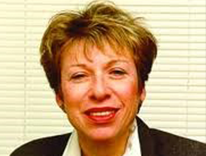 Dr. Marcelle Arak is an expert on financial and commodity market risk. She was formerly Professor of Risk Management and Finance at the University of Colorado Denver where she taught courses on financial and commodity derivatives. Dr. Arak serves as an advisor to money managers here, and to Finance Ministries and Central Banks abroad. Before joining the University, Dr. Arak headed Citibank's Structured Interest Rates Options and Guarantees Department. Her group was one of Wall Street's major providers of over-the-counter interest rate options, interest rate locks, and "swaptions". Prior to building that new business for Citibank, Dr. Arak headed the Capital Markets Analysis Department, the group of bond quants that provided advice to institutional customers of Citibank as well as for the Bank's own risk management. Still earlier, she was Vice President and Head of the US economic and financial research group at the Federal Reserve Bank of New York. Dr. Arak earned her Ph.D. in Economics at MIT and her BA at the University of Rochester. She has published extensively on financial market issues, including derivatives such as options, futures, and interest rate swaps.
Dr. Marcelle Arak is an expert on financial and commodity market risk. She was formerly Professor of Risk Management and Finance at the University of Colorado Denver where she taught courses on financial and commodity derivatives. Dr. Arak serves as an advisor to money managers here, and to Finance Ministries and Central Banks abroad. Before joining the University, Dr. Arak headed Citibank's Structured Interest Rates Options and Guarantees Department. Her group was one of Wall Street's major providers of over-the-counter interest rate options, interest rate locks, and "swaptions". Prior to building that new business for Citibank, Dr. Arak headed the Capital Markets Analysis Department, the group of bond quants that provided advice to institutional customers of Citibank as well as for the Bank's own risk management. Still earlier, she was Vice President and Head of the US economic and financial research group at the Federal Reserve Bank of New York. Dr. Arak earned her Ph.D. in Economics at MIT and her BA at the University of Rochester. She has published extensively on financial market issues, including derivatives such as options, futures, and interest rate swaps.
THOMAS BRADY
Chief Economist, Newmont Mining
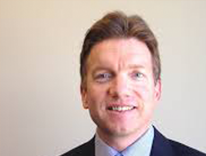 Tom currently leads the Strategic Planning function at Newmont Mining Corporation and is responsible for portfolio modeling and analysis for the Company's capital investment decisions. Previously at Newmont, Tom has held positions in Investor Relations and Treasury where he developed and implemented the Company's commodity and foreign exchange hedging programs as well as an Enterprise Risk Management process.
Tom currently leads the Strategic Planning function at Newmont Mining Corporation and is responsible for portfolio modeling and analysis for the Company's capital investment decisions. Previously at Newmont, Tom has held positions in Investor Relations and Treasury where he developed and implemented the Company's commodity and foreign exchange hedging programs as well as an Enterprise Risk Management process.
Previously Tom was a Senior Manager at Risk Capital Management, a consultancy that advised energy and natural resource companies on financial risk, valuation and commodity hedging. Tom has also worked with CQG, Inc. where he developed a suite of automated trading systems for commodity futures contracts using the Company's short-term, price and volume charting methods. Tom holds a Ph.D. in Mineral Economics with research emphases in commodity markets from the Colorado School of Mines. In addition, Tom holds a Masters degree in Mathematics, also from the Colorado School of Mines.
COLIN CARTER
Professor of Agricultural Economics, University of California, Davis
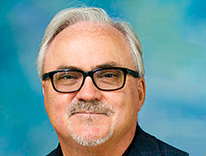 Colin A. Carter has been a Professor of Agricultural and Resource Economics at UC Davis for 12 years, after serving as a professor at the University of Manitoba. His research investigates problems related to agricultural policy and trade, with a focus on grain markets in the Pacific Rim. He has written extensively on state trading enterprises in grains. Carter has studied the internal grain economy in China and China's participation in the international market. From 1986-89, Carter held a fellowship in international food systems from the Kellogg Foundation. Along with scores of professional journal articles, chapters and reports, Carter has co-authored several books, the topics of which include China's grain markets, futures markets, and U.S. agricultural policy. Carter was raised on a grain farm in Alberta, Canada, and received his B.S. and M.S. degrees from the University of Alberta. His PhD in Agricultural Economics is from UC Berkeley in 1980.
Colin A. Carter has been a Professor of Agricultural and Resource Economics at UC Davis for 12 years, after serving as a professor at the University of Manitoba. His research investigates problems related to agricultural policy and trade, with a focus on grain markets in the Pacific Rim. He has written extensively on state trading enterprises in grains. Carter has studied the internal grain economy in China and China's participation in the international market. From 1986-89, Carter held a fellowship in international food systems from the Kellogg Foundation. Along with scores of professional journal articles, chapters and reports, Carter has co-authored several books, the topics of which include China's grain markets, futures markets, and U.S. agricultural policy. Carter was raised on a grain farm in Alberta, Canada, and received his B.S. and M.S. degrees from the University of Alberta. His PhD in Agricultural Economics is from UC Berkeley in 1980.
GRAHAM DAVIS
Professor of Economics, Colorado School of Mines
 Graham A. Davis is Emeritus Professor of Mineral Economics at the Colorado School of Mines. He holds a B.S. in Metallurgical Engineering from Queen's University, an MBA from the University of Cape Town, and a Ph.D. in Mineral Economics from the Pennsylvania State University. Prior to joining academia, Graham worked as a metallurgical engineer at mines in Canada and Namibia. His research focuses on the valuation of mineral and energy assets under uncertainty and on the impacts of mining on economic and human development. He serves on the editorial board of Resources Policy and the Journal of Commodity Markets. In 2014 he received the Mineral Economics Award from the Society for Mining, Metallurgy, and Exploration and the American Institute of Mining, Metallurgical, and Petroleum Engineers.
Graham A. Davis is Emeritus Professor of Mineral Economics at the Colorado School of Mines. He holds a B.S. in Metallurgical Engineering from Queen's University, an MBA from the University of Cape Town, and a Ph.D. in Mineral Economics from the Pennsylvania State University. Prior to joining academia, Graham worked as a metallurgical engineer at mines in Canada and Namibia. His research focuses on the valuation of mineral and energy assets under uncertainty and on the impacts of mining on economic and human development. He serves on the editorial board of Resources Policy and the Journal of Commodity Markets. In 2014 he received the Mineral Economics Award from the Society for Mining, Metallurgy, and Exploration and the American Institute of Mining, Metallurgical, and Petroleum Engineers.
COLIN FENTON
Managing Partner & Head of Research, Blacklight Research LLC
 Colin Fenton is a non-resident Fellow at the Center on Global Energy Policy. Since 2010, Fenton supervised commodities research at J.P. Morgan Chase & Co., where he was also the firm's chief commodities strategist, until stepping down recently. Earlier in his career, Fenton was a managing partner at Curium Capital Advisors, a managing director at Duquesne Capital Management, the Chief Intelligence Officer of Ospraie Management, and a member of the Commodities Research Group at Goldman, Sachs & Co. Fenton holds a Master's of Science in Foreign Service from Georgetown University's Edmund A. Walsh School of Foreign Service. He also is a graduate of Princeton University, where he studied history.
Colin Fenton is a non-resident Fellow at the Center on Global Energy Policy. Since 2010, Fenton supervised commodities research at J.P. Morgan Chase & Co., where he was also the firm's chief commodities strategist, until stepping down recently. Earlier in his career, Fenton was a managing partner at Curium Capital Advisors, a managing director at Duquesne Capital Management, the Chief Intelligence Officer of Ospraie Management, and a member of the Commodities Research Group at Goldman, Sachs & Co. Fenton holds a Master's of Science in Foreign Service from Georgetown University's Edmund A. Walsh School of Foreign Service. He also is a graduate of Princeton University, where he studied history.
JEFFREY FRANKEL 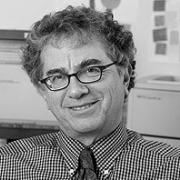
James W. Harpel Professor of Capital Formation and Growth, Harvard University's Kennedy School
Jeffrey Frankel is a Research Associate at the National Bureau of Economic Research, where he is on the Business Cycle Dating Committee, which officially declares recessions. He served at the Council of Economic Advisers in 1983-84 and 1996-99. As CEA Member in the Clinton Administration, Frankel's responsibilities included international economics, macroeconomics, and the environment. Before coming to Harvard in 1999, he was Professor of Economics at the University of California at Berkeley. Born in San Francisco, he graduated from Swarthmore College, and received his economics PhD from MIT.
His research interests include international finance, commodities, currencies, crises, monetary policy, fiscal policy, regional blocs, and international environmental issues. RePEc ranks him among the 50 most-cited economists. He writes a monthly column at Project Syndicate and blog, and co-directs annually the NBER ISoM and Harvard PEIF conferences.
ROBERT GRAY
Commodities Strategist, Resource Capital Funds (RCF)
In this capacity, Robert provides a macro and micro level perspective on what factors impact RCF and our underlying fund performance. The role is an important contributor to RCF's market insight and how our investment decisions create value for our partners. As such, he seeks to clarify market complexity and serve as an advocate in matters of interest to RCF.
Prior to joining RCF, he gained 20 years of economic, strategy, risk and valuation experience working for PwC and Merrill Lynch in the energy, metals & mining, resources, and financial derivatives sectors of the global economy. Over these years, he has lived in Perth, Melbourne, London and New York; often traveling and working in emerging markets on resource sector development projects.
Robert has a BA honors in Economics / International Areas Studies from the University of California, Los Angeles (UCLA) and has held a CFA charter since 2003.
BOB GREER
Scholar in Residence, J.P. Morgan Center for Commodities
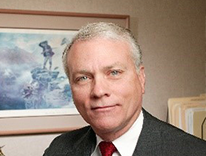 Mr. Bob Greer is the first person to define an investable commodity index and is a pioneer in explaining why commodity indexes are an asset class distinct from stocks and bonds. He developed one of the two common methods of explaining sources of commodity index returns and has spoken on this asset class on national television, at industry conferences and trade meetings globally, and at college lectures at Yale, Oxford, Columbia, Princeton and elsewhere. Bob spent eight years managing the commodity index businesses at Daiwa Securities, Chase Manhattan Bank, and JPMorgan before joining PIMCO in 2002 to build their inflation products business. Under his 13 years of leadership, PIMCO's commodity business grew from a single pilot account to become the world's largest commodity investment management business, at one time responsible for $35 billion in accounts. During this time the other inflation strategies for which Bob had business responsibility (inflation-linked bonds, real estate, and certain multi-asset strategies) also grew so that his lines of business included over $100 billion in assets under management. For more than two decades Bob's primary interest has been the business of commodity investment; so much so that the Chicago Mercantile Exchange has referred to him as "the godfather of commodity investing." He has also published articles on the subject in The Journal of Portfolio Management, The Journal of Derivatives, The Journal of Alternative Investments, and Pensions & Investments. He has consulted on the subject of commodities to the CIA, the Bank of England and the New York Fed, and participated in the CFTC's Agricultural Roundtable in April 2008. Mr. Greer wrote The Handbook of Inflation Hedging Investments, oriented to the institutional investment community, which was published by McGraw Hill in December 2005. He also co-authored Intelligent Commodity Indexing, published by McGraw Hill in 2012. Among other interests since retiring from PIMCO, Bob serves as a scholar-in-residence at the JPMorgan Center for Commodities, part of the University Of Colorado Graduate School Of Business. He received a bachelor degree in mathematics and economics from Southern Methodist University and earned an MBA from the Stanford Graduate School of Business.
Mr. Bob Greer is the first person to define an investable commodity index and is a pioneer in explaining why commodity indexes are an asset class distinct from stocks and bonds. He developed one of the two common methods of explaining sources of commodity index returns and has spoken on this asset class on national television, at industry conferences and trade meetings globally, and at college lectures at Yale, Oxford, Columbia, Princeton and elsewhere. Bob spent eight years managing the commodity index businesses at Daiwa Securities, Chase Manhattan Bank, and JPMorgan before joining PIMCO in 2002 to build their inflation products business. Under his 13 years of leadership, PIMCO's commodity business grew from a single pilot account to become the world's largest commodity investment management business, at one time responsible for $35 billion in accounts. During this time the other inflation strategies for which Bob had business responsibility (inflation-linked bonds, real estate, and certain multi-asset strategies) also grew so that his lines of business included over $100 billion in assets under management. For more than two decades Bob's primary interest has been the business of commodity investment; so much so that the Chicago Mercantile Exchange has referred to him as "the godfather of commodity investing." He has also published articles on the subject in The Journal of Portfolio Management, The Journal of Derivatives, The Journal of Alternative Investments, and Pensions & Investments. He has consulted on the subject of commodities to the CIA, the Bank of England and the New York Fed, and participated in the CFTC's Agricultural Roundtable in April 2008. Mr. Greer wrote The Handbook of Inflation Hedging Investments, oriented to the institutional investment community, which was published by McGraw Hill in December 2005. He also co-authored Intelligent Commodity Indexing, published by McGraw Hill in 2012. Among other interests since retiring from PIMCO, Bob serves as a scholar-in-residence at the JPMorgan Center for Commodities, part of the University Of Colorado Graduate School Of Business. He received a bachelor degree in mathematics and economics from Southern Methodist University and earned an MBA from the Stanford Graduate School of Business.
JAMES HAMILTON
Professor of Economics, University of California, San Diego
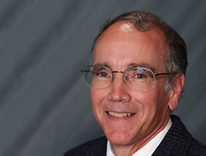 Professor Hamilton has published on a wide range of topics. His research in areas including econometrics, business cycles, monetary policy, and energy markets has been cited by more than 40,000 other studies. His graduate textbook on time series analysis has sold over 50,000 copies and has been translated into Chinese, Japanese, and Italian. He also contributes to Econbrowser, a popular economics blog. Academic honors include election as a Fellow of the Econometric Society and Research Associate with the National Bureau of Economic Research, receipt of the Best Paper Award for 2010-2011 from the International Institute of Forecasters, and 2014 award for Outstanding Contributions to the Profession from the International Association for Energy Economics. He has been a visiting scholar at the Federal Reserve Board in Washington, DC, as well as the Federal Reserve Banks of Atlanta, Boston, New York, Richmond, and San Francisco. He has also been a consultant for the National Academy of Sciences, Commodity Futures Trading Commission and the European Central Bank and has testified before the United States Congress. Hamilton received the UCSD Economics Department Graduate Teaching Award on five different occasions.
Professor Hamilton has published on a wide range of topics. His research in areas including econometrics, business cycles, monetary policy, and energy markets has been cited by more than 40,000 other studies. His graduate textbook on time series analysis has sold over 50,000 copies and has been translated into Chinese, Japanese, and Italian. He also contributes to Econbrowser, a popular economics blog. Academic honors include election as a Fellow of the Econometric Society and Research Associate with the National Bureau of Economic Research, receipt of the Best Paper Award for 2010-2011 from the International Institute of Forecasters, and 2014 award for Outstanding Contributions to the Profession from the International Association for Energy Economics. He has been a visiting scholar at the Federal Reserve Board in Washington, DC, as well as the Federal Reserve Banks of Atlanta, Boston, New York, Richmond, and San Francisco. He has also been a consultant for the National Academy of Sciences, Commodity Futures Trading Commission and the European Central Bank and has testified before the United States Congress. Hamilton received the UCSD Economics Department Graduate Teaching Award on five different occasions.
DAVE HAMMOND
Principal, Hammond International Group
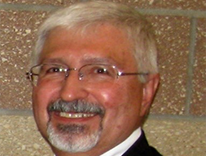 Dr. David Hammond has over 40 years' experience in the mining and petroleum industries as a geologist, engineer, financial market analyst and mineral economist. He has had staff and management positions with Shell Oil, Atlantic Richfield, Anaconda Minerals, ARCO Coal, General Electric and PricewaterhouseCoopers. Most recently he was VP of Strategic Planning for International Royalty Corporation, having also served as Interim CFO during IRC's 2005 Initial Public Offering on the TSX. He holds BS and MS degrees in Geological Engineering from the South Dakota School of Mines and the University of Utah respectively, as well as an MBA in energy finance from the University of Denver and a PhD in Mineral Economics from the Colorado School of Mines.
Dr. David Hammond has over 40 years' experience in the mining and petroleum industries as a geologist, engineer, financial market analyst and mineral economist. He has had staff and management positions with Shell Oil, Atlantic Richfield, Anaconda Minerals, ARCO Coal, General Electric and PricewaterhouseCoopers. Most recently he was VP of Strategic Planning for International Royalty Corporation, having also served as Interim CFO during IRC's 2005 Initial Public Offering on the TSX. He holds BS and MS degrees in Geological Engineering from the South Dakota School of Mines and the University of Utah respectively, as well as an MBA in energy finance from the University of Denver and a PhD in Mineral Economics from the Colorado School of Mines.
VINCE KAMINSKI
Professor of Energy Management, Rice University
Mr. Vincent Kaminski has spent 14 years working in different positions related to quantitative analysis and risk management in the merchant energy industry. The companies he worked for include Citigroup, Sempra Energy Trading, Reliant Energy, Citadel Investment Group, and Enron (from 1992 to 2002) where he was the head of the quantitative modeling group. Prior to starting a career in the energy industry, Mr. Kaminski was a Vice-President in the Research Department, Bond Portfolio Analysis Group, of Salomon Brothers in New York (from 1986 to 1992).
Mr. Kaminski is a Professor in the Practice of Energy Management at Jesse H. Jones Graduate School of Business at Rice University. He teaches MBA level classes on energy markets, energy risk management and valuation of energy, as well as classes in the executive education program.
Mr. Kaminski holds an M.S. degree in international economics, a Ph.D. degree in theoretical economics from the Main School of Planning and Statistics in Warsaw, Poland, and an MBA from Fordham University in New York. He is a recipient of the 1999 James H. McGraw award for Energy Risk Management (Energy Risk Manager of the Year). Mr. Kaminski published a number of papers, and contributed to several books, on energy markets. His recent publications in the risk management and commodity options pricing areas include: Managing Energy Price Risk, Risk Books, London 1999, all three subsequent editions, editor and coauthor; The Challenge of Pricing and Risk Managing Electricity Derivatives, in: The US Power Market, Risk Publications, London 1997, author; Energy Derivatives: Pricing and Risk Management, Lacima Publications, London 2000, contributor; and Energy Modeling. Advances in the Management of Uncertainty, London 2005, editor and coauthor.
LUTZ KILIAN
Professor of Economics, University of Michigan
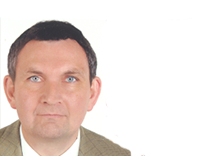 He joined the faculty at Michigan in 1996. Prior to his Ph.D., he worked for the research department of the Inter-American Development Bank in Washington, DC. During 2001-03 he served as an adviser to the European Central Bank in Frankfurt/M., Germany. Professor Kilian has been a research visitor at the Federal Reserve Board, the European Central Bank, and the International Monetary Fund. He has also been a consultant for the International Monetary Fund, the Inter-American Development Bank, the World Trade Organization, the European Central Bank, the Bank of Canada, the European Parliament, and the U.S. Energy Information Administration, among others. Professor Kilian has published over 80 articles. His work has appeared in leading general interest and field journals in economics and statistics. His research interests include time series econometrics, empirical macroeconomics, and energy economics. Much of his recent research is concerned with the sources of fluctuations in the price of oil, with the transmission of oil price shocks, with the role of speculation in oil markets, with measuring oil price expectations in financial markets, and with oil price forecasting.
He joined the faculty at Michigan in 1996. Prior to his Ph.D., he worked for the research department of the Inter-American Development Bank in Washington, DC. During 2001-03 he served as an adviser to the European Central Bank in Frankfurt/M., Germany. Professor Kilian has been a research visitor at the Federal Reserve Board, the European Central Bank, and the International Monetary Fund. He has also been a consultant for the International Monetary Fund, the Inter-American Development Bank, the World Trade Organization, the European Central Bank, the Bank of Canada, the European Parliament, and the U.S. Energy Information Administration, among others. Professor Kilian has published over 80 articles. His work has appeared in leading general interest and field journals in economics and statistics. His research interests include time series econometrics, empirical macroeconomics, and energy economics. Much of his recent research is concerned with the sources of fluctuations in the price of oil, with the transmission of oil price shocks, with the role of speculation in oil markets, with measuring oil price expectations in financial markets, and with oil price forecasting.
BENJAMIN LEE
Research Scientist, Natl Renewable Energy Laboratory
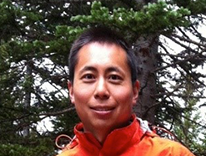 Benjamin Lee is a Research Scientist working on Photovoltaics at the National Renewable Energy Lab (NREL), in Golden, Colorado. He has broad knowledge of renewable energy technologies, and has particular expertise in high-efficiency solar cells. He received the B.S. degree from the California Institute of Technology (Caltech) in 2002 and a Ph.D. in Applied Physics from Harvard University in 2009. He has previously been a Visiting Professor, in the Department of Electrical Engineering at the Indian Institute of Technology, Bombay, in Mumbai, India. Additionally, in 2014 he was a Visiting Scientist at the Fraunhofer Institute for Solar Energy Systems (ISE) in Germany; during that year he worked on a cooperative project between NREL and ISE for high efficiency silicon solar cells.
Benjamin Lee is a Research Scientist working on Photovoltaics at the National Renewable Energy Lab (NREL), in Golden, Colorado. He has broad knowledge of renewable energy technologies, and has particular expertise in high-efficiency solar cells. He received the B.S. degree from the California Institute of Technology (Caltech) in 2002 and a Ph.D. in Applied Physics from Harvard University in 2009. He has previously been a Visiting Professor, in the Department of Electrical Engineering at the Indian Institute of Technology, Bombay, in Mumbai, India. Additionally, in 2014 he was a Visiting Scientist at the Fraunhofer Institute for Solar Energy Systems (ISE) in Germany; during that year he worked on a cooperative project between NREL and ISE for high efficiency silicon solar cells.
MIKE MILLER
VP Risk Management, Ardent Mills
 Mike oversees the entire Risk Management Team, from the Wheat traders, Midds traders to Risk Management Services. The Risk function works to expand and protect Ardent Mills' total business margin.
Mike oversees the entire Risk Management Team, from the Wheat traders, Midds traders to Risk Management Services. The Risk function works to expand and protect Ardent Mills' total business margin.
In Mike's 20+ years with Cargill, he started in January 1991 as a Millfeed Merchant in Wichita, Kansas. He then led the newly consolidated Cargill Flour Milling Millfeed Trading Department and remained in that position until 1997. Mike assumed the position of Spring Wheat Product Line Manager from 1997 – 1998. Following this role, he became the Eastern Region Merchandising Manager for Cargill Flour Milling. Mike held this position until the year 2000 and then was provided with the opportunity to become the Merchandising Manager for Mercosur flour milling in Buenos Aries Argentina.
Following his expat experience, Mike moved to Florida and assumed the role of Assistant Vice President and Commercial Manager for Cargill Juice. In 2008 he moved back to Minneapolis and assumed the role of Risk Management Leader for Cargill AgHorizons. Mike remained in this role until 2010 and then moved to the Horizon Milling business unit as the Vice President and Merchandising Leader.
Bluford Putnam
Chief Economist, CME Group
Bluford (Blu) Putnam has served as Managing Director and Chief Economist of CME Group since May 2011. He is responsible for leading economic analysis on global financial markets by identifying emerging trends, evaluating economic factors and forecasting their impact on CME Group and the company's business strategy. He also serves as CME Group's spokesperson on global economic conditions and manages external research initiatives.
Prior to joining CME Group, Putnam gained more than 35 years of experience in the financial services industry with concentrations in central banking, investment research and portfolio management. He most recently served as Managing Partner for Bayesian Edge Technology & Solutions, Ltd., a financial risk management and portfolio advisory service he founded in 2000. He also has served as President of CDC Investment Management Corporation and Managing Director and Chief Investment Officer for Equities and Asset Allocation at the Bankers Trust Company in New York. His background also includes economist positions with Kleinwort Benson, Ltd., Morgan Stanley & Company, Chase Manhattan Bank and the Federal Reserve Bank of New York. Putnam holds a bachelor's degree in liberal arts from Florida Presbyterian College (later renamed Eckerd College) and a Ph.D.in economics from Tulane University. He has authored five books on international finance, as well as many articles that have been published in academic journals and business publications.
FOREST REINHARDT
Professor of Economics, Harvard Business School
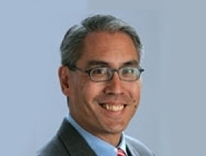 Forest L. Reinhardt is the John D. Black Professor of Business Administration at Harvard Business School. Reinhardt is co-chair of the Harvard Business School's Global Energy Seminar, a new executive education course for the leaders of firms that produce oil and gas, generate and distribute electricity, or play other important roles in the delivery of energy services. He also teaches regularly in the HBS Agribusiness Seminar. In the HBS Owner/President Management Program, Reinhardt teaches a core course on Global Markets. Drawing on microeconomics, macroeconomics, political science, and history, the course helps business leaders understand the economic and political environment in which business is conducted, and the strategic opportunities and risks to which globalization gives rise.
Forest L. Reinhardt is the John D. Black Professor of Business Administration at Harvard Business School. Reinhardt is co-chair of the Harvard Business School's Global Energy Seminar, a new executive education course for the leaders of firms that produce oil and gas, generate and distribute electricity, or play other important roles in the delivery of energy services. He also teaches regularly in the HBS Agribusiness Seminar. In the HBS Owner/President Management Program, Reinhardt teaches a core course on Global Markets. Drawing on microeconomics, macroeconomics, political science, and history, the course helps business leaders understand the economic and political environment in which business is conducted, and the strategic opportunities and risks to which globalization gives rise.
Reinhardt is interested in the relationships between market and nonmarket strategy, the relations between government regulation and corporate strategy, the behavior of private and public organizations that manage natural resources, and the economics of externalities and public goods. He is the author of Down to Earth: Applying Business Principles to Environmental Management, published by Harvard Business School Press. Like that book, many of his articles and papers analyze problems of environmental and natural resource management. He has written numerous classroom cases on these and related topics, used at Harvard and many other schools in MBA curricula and in executive programs. Reinhardt received his Ph.D. in Business Economics from Harvard University in 1990. He also holds an MBA from Harvard Business School, where he was a Baker Scholar, and an A.B., cum laude, from Harvard College.
MARGARET SLADE
Professor Emeritus of Economics, University of British Columbia
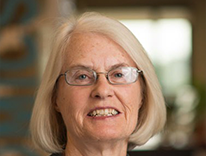 She has published scholarly articles in numerous academic journals, including Econometrica, the Review of Economic Studies, and the Quarterly Journal of Economics, and has served in an editorial capacity for a number of scholarly journals. She was awarded an Honorary Doctorate from the Helsinki School of Economics, and she was President of the European Association for Research in Industrial Economics (EARIE). Finally she has held visiting positions in France, Germany, the UK, Belgium, Finland, and the US. Margaret received a bachelor's degree from Vassar College and a master's degree from the University of California, Berkeley, both in mathematics. She worked as a mathematician for Shell Development in California, the Department of Scientific and Industrial Research in New Zealand, and the US Geological Survey in California and Washington, DC before obtaining a Ph.D. in economics from the George Washington University. Her earlier involvement with the energy and mining sectors spurred her interest in commodities, particularly mineral commodities. She has assessed pricing, trading, and investment in fuel and nonfuel minerals as well as how those aspects of markets are influenced by market structure.
She has published scholarly articles in numerous academic journals, including Econometrica, the Review of Economic Studies, and the Quarterly Journal of Economics, and has served in an editorial capacity for a number of scholarly journals. She was awarded an Honorary Doctorate from the Helsinki School of Economics, and she was President of the European Association for Research in Industrial Economics (EARIE). Finally she has held visiting positions in France, Germany, the UK, Belgium, Finland, and the US. Margaret received a bachelor's degree from Vassar College and a master's degree from the University of California, Berkeley, both in mathematics. She worked as a mathematician for Shell Development in California, the Department of Scientific and Industrial Research in New Zealand, and the US Geological Survey in California and Washington, DC before obtaining a Ph.D. in economics from the George Washington University. Her earlier involvement with the energy and mining sectors spurred her interest in commodities, particularly mineral commodities. She has assessed pricing, trading, and investment in fuel and nonfuel minerals as well as how those aspects of markets are influenced by market structure.
In addition to her academic career in economics, Margaret worked for one year for the US Federal Trade Commission. Furthermore, she has been a consultant on competition policy to competition authorities in Canada, the US, the UK, and the EU as well as to private parties.
HILARY TILL
Solich Scholar, J.P. Morgan Center for Commodities
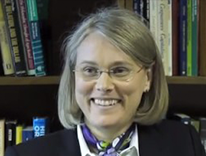 Hilary Till is also the principal of Premia Research LLC, which designs investment indices that are calculated by S&P Dow Jones Indices.
Hilary Till is also the principal of Premia Research LLC, which designs investment indices that are calculated by S&P Dow Jones Indices.
Previously, Ms. Till was the Chief of Derivatives Strategies at Putnam Investments, and, prior to her Putnam appointment, was an analyst at the Harvard Management Company, the university's endowment management firm.
Ms. Till has presented her analysis of the commodity futures markets to the following institutions: the U.S. Commodity Futures Trading Commission, the International Energy Agency, and to the (then) U.K. Financial Services Authority. She has also been a panel member at both the U.S. Energy Information Administration's workshop on the "evolution of the petroleum market and [its] price dynamics" and the Bank of Canada's joint roundtable with the International Energy Forum on "commodity cycles and their implications."
She presently serves on the North American Advisory Board of the London School of Economics; is a Solich Scholar and a member of the Research Council within the J.P. Morgan Center for Commodities at the University of Colorado-Denver Business School; and is a Research Associate at the EDHEC-Risk Institute in Nice, France. In Chicago, Ms. Till is a member of the Federal Reserve Bank of Chicago's Working Group on Financial Markets; is an Advisory Board Member of DePaul University's Arditti Center for Risk Management; and has provided seminars (in Chicago) to staff from the Shanghai Futures Exchange and the China Financial Futures Exchange.
Ms. Till is the co-editor of "Intelligent Commodity Investing," which, in turn, is a bestseller for the London publisher, Risk Books. She has also been published in the Journal of Alternative Investments, the Journal of Wealth Management, Quantitative Finance, and in the Singapore Economic Review. Ms. Till has a B.A. with General Honors in Statistics from the University of Chicago and an M.Sc. degree in Statistics from the London School of Economics (LSE). Ms. Till studied at the LSE under a private fellowship administered by the Fulbright Commission.
LANCE TITUS
Managing Director, Uniper Global Commodities
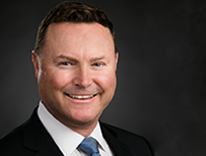 Mr. Lance Titus serves as Managing Director of Business Development, Origination and Structured Transactions at Uniper Global Commodities. He has over twenty years of commodities trading, structuring and risk management experience. Having held senior leadership roles from Wall Street to the energy industry, working for an investment bank, as well as for leading utilities, unregulated entities and merchant energy firms. He has transacted over $15 Billion in deals across the energy and environmental commodity markets with a sector focus in electricity, natural gas, renewables, carbon and emissions. Mr. Titus has been a featured panelist at Bloomberg's "The Future of Energy Summit" in New York, and also serves as an adjunct professor for the course, "Foundations of Commodities" at the University of Colorado Denver.
Mr. Lance Titus serves as Managing Director of Business Development, Origination and Structured Transactions at Uniper Global Commodities. He has over twenty years of commodities trading, structuring and risk management experience. Having held senior leadership roles from Wall Street to the energy industry, working for an investment bank, as well as for leading utilities, unregulated entities and merchant energy firms. He has transacted over $15 Billion in deals across the energy and environmental commodity markets with a sector focus in electricity, natural gas, renewables, carbon and emissions. Mr. Titus has been a featured panelist at Bloomberg's "The Future of Energy Summit" in New York, and also serves as an adjunct professor for the course, "Foundations of Commodities" at the University of Colorado Denver.
Mr. Titus holds an MBA from the University of Denver, Daniels College of Business. and a B.S. degree in Finance and Marketing from Clarion University. He serves on the Advisory Board of cQuant.io, is a member of the J.P. Morgan Center for Commodities Advisory Council, serves on its Research Council and is a member of the Global Commodities Applied Research Digest Editorial Advisory Board.
ROBERT VIGFUSSON
Section Chief, Federal Reserve Board
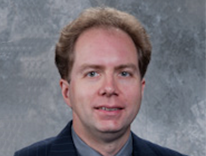 His section covers developments in both U.S. international trade as well as energy and other commodity markets. Robert has published in respected economic journals on oil and commodity prices. He has written on forecasting the price of oil, the impact of oil price shocks on the U.S. economy, and the volatility of commodity prices. He joined the Federal Reserve Board in 2002, after completing his Ph.D. studies at Northwestern University. He graduated with a Bachelor of Science from the University of Manitoba in 1994.
His section covers developments in both U.S. international trade as well as energy and other commodity markets. Robert has published in respected economic journals on oil and commodity prices. He has written on forecasting the price of oil, the impact of oil price shocks on the U.S. economy, and the volatility of commodity prices. He joined the Federal Reserve Board in 2002, after completing his Ph.D. studies at Northwestern University. He graduated with a Bachelor of Science from the University of Manitoba in 1994.
BRIAN DAVERN WRIGHT
Professor, Department of Agricultural & Resource Economics
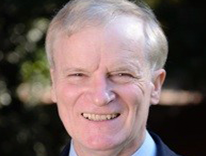 Brian Wright's interests in the economics of commodity markets, innovation and intellectual property rights date from his early experiences on his family's sheep station near Wakool in the Riverina district of New South Wales, Australia. He received a Bachelor of Agricultural Economics (First Class Honors) from the University of New England, Armidale, and won a Frank Knox Fellowship to Harvard University, where he received a Ph.D. in Economics. He then joined Yale University's Economics Department and is now Professor of Agricultural and Resource Economics at the University of California, Berkeley, recently ranked top in its field in research and reputation by the United States National Research Council. His research interests include economics of markets for storable commodities, market stabilization, futures markets, agricultural policy, industrial organization, public finance, invention incentives, intellectual property rights, the economics of research and development, and the economics of conservation and innovation of genetic resources. He has co-authored or co-edited several books, including Storage and Commodity Markets; Reforming Agricultural Commodity Policy; Saving Seeds: The Economics of Conserving Genetic Resources at the CGIAR Centers, and Accessing Biodiversity and Sharing the Benefits: Lessons from Implementing the Convention on Biodiversity. He has published extensively in the leading journals in Economics and Agricultural Economics and in Nature, Nature Biotechnology, The Handbook of Plant Biotechnology, and Crop Science.
Brian Wright's interests in the economics of commodity markets, innovation and intellectual property rights date from his early experiences on his family's sheep station near Wakool in the Riverina district of New South Wales, Australia. He received a Bachelor of Agricultural Economics (First Class Honors) from the University of New England, Armidale, and won a Frank Knox Fellowship to Harvard University, where he received a Ph.D. in Economics. He then joined Yale University's Economics Department and is now Professor of Agricultural and Resource Economics at the University of California, Berkeley, recently ranked top in its field in research and reputation by the United States National Research Council. His research interests include economics of markets for storable commodities, market stabilization, futures markets, agricultural policy, industrial organization, public finance, invention incentives, intellectual property rights, the economics of research and development, and the economics of conservation and innovation of genetic resources. He has co-authored or co-edited several books, including Storage and Commodity Markets; Reforming Agricultural Commodity Policy; Saving Seeds: The Economics of Conserving Genetic Resources at the CGIAR Centers, and Accessing Biodiversity and Sharing the Benefits: Lessons from Implementing the Convention on Biodiversity. He has published extensively in the leading journals in Economics and Agricultural Economics and in Nature, Nature Biotechnology, The Handbook of Plant Biotechnology, and Crop Science.

